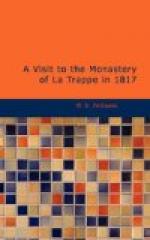“Il existait au milieu de la derniere cour un tres beau puits, taille dans le roc et extremement profond: il est actuellement comble, et ma plume se refuse a tracer les scenes horribles qui ensanglanterent ce lieu en 1793 et en 1795, tristes et epouvantables effets des guerres civiles!”
This passage alludes, I imagine, to the circumstance related in page 90. Within its walls are various inscriptions, many of them in characters so difficult to decypher, that they remain unknown. The following has been rendered into more modern French by Cerutti.
J’ai gravi, mesure ces ruines sublimes;
Mon coeur s’en est emu! De
nos vaillants aieux
Tout y representait les tournois magnanimes,
Ils semblaient reparoitre et combattre
a mes yeux;
J’entendois sous leurs coups retentir
les abimes;
Juge de leurs combats, idole de leur coeur,
Du haut des tours, la dame admiroit le
vainqueur.
Casques et boucliers, cuirasses gigantesques,
Cris d’armes, mot d’amour,
devises de l’honneur,
Carlets pour l’infidele ou pour
le suborneur,
Tout garde sur ces murs vraiment chevaleresques.
La memoire d’un siecle ou l’epee,
ou la foi,
Ou la galanterie etaient la seule loi.
Louis IX. and Blanche of Castille, his queen, retired to Clisson, at the time the English, under Henry III. penetrated into Poitou, and were received by Olivier de Clisson, who then garrisoned it.
In the war of the League, which convulsed the kingdom of France, Clisson remained faithful to Henry III. and during the early part of the reign of his successor Henry IV. The Protestants were there protected, and established themselves in the fauxbourg. From the period at which Henry IV. signed the edict at Nantes, 15th April, 1598, until the war of La Vendee, this celebrated fortress is no where mentioned by any of the French historians: it became neglected when the feudal system declined, and the republican army completed its ruin. The sad events of this period, and the destruction and carnage which followed, can never be effaced from the page of history. The ruined towns and villages prove the melancholy truth, that the general corruption of a nation prepares the way for general anarchy, and that the blindness of political rage is always more vindictive than even private hatred.
I can never sufficiently lament the absence, at this time, of Madame de La Roche-Jaquelin from the country, as she occasionally resides in the neighbourhood, since the restoration of her property, (although her once noble residence is now in a state of ruin,) occupying a small chateau at some small distance, which had partly escaped the fire and destruction that had been fatal to most houses in the district. Who can read the interesting memoirs of this Lady, and not sympathize in the sufferings of herself, and of those brave and loyal people whose heroic struggle against their republican oppressors lasted with little intermission




